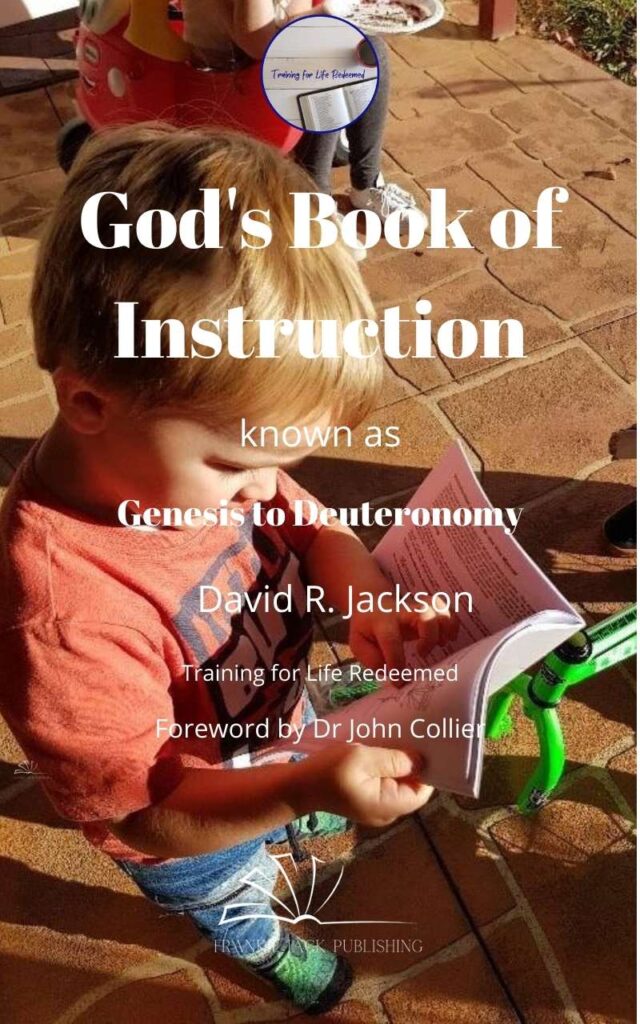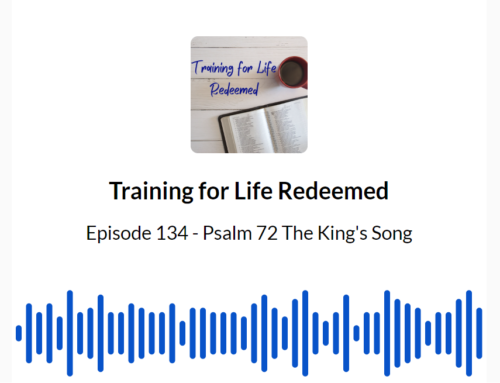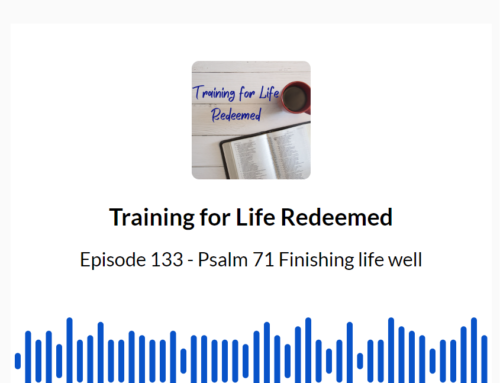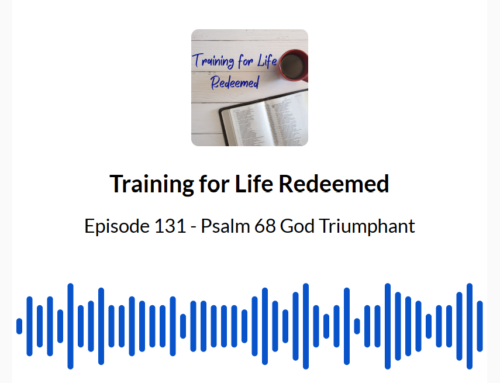Grab your notes for this episode by completing the form
and we will send you the link to all our notes.
Get the book “God’s Book of Instruction” on Amazon.
The first five books of the Old Testament constitute God’s book of instructions for his redeemed people. It reveals the character of God and his good design for life. It bears witness to the beginning of his work of redemption. It equips the believer to live in God’s world, God’s way, as God’s image for God’s glory. What sin and death have broken, God’s people can rebuild by keeping to his instructions by the power of his presence with us.
Transcript
Dan:
Hello, and welcome to episode 19 of training for life redeemed. I’m Dan , your host, and I’m here with my dad, David Jackson. And in this episode, we’re going to be talking about the New Testament understanding that Jesus is Yahweh. We have finished reading through the Torah where Yahweh is saving his people out of Egypt. When we come to the new Testament, we discover that Jesus is Yahweh. Now this Dad is quite confusing for a lot of people. The Bible says that God is one. There is only one God. How can Jesus be Yahweh? I mean, Jesus said he does nothing o f h is o wn accord. Jesus prayed to God. He obeyed God; He’s anointed by God. He’s filled by God. How can he be God?
David:
I think we have to start by realizing that God doesn’t have to fit , in fact, he doesn’t fit into the same limitations of his creation. We are derivative we’re image of God. That means we’re so much simpler than he is, is without limits of any kind. If we can’t comprehend the complexity of who God is, well that’s as it must be because he’s God not a creature like us. He exists apart from time and space. If God were not three persons, then the statement that God is love Wouldn’t work. For God to be love. He would have to be love apart from his creation because he existed before time. So who did he love? The answer lies in the relationship between God, the father, the son, and the Holy spirit. Now that being said, we also have to remember that God doesn’t have parts. You can’t chop God up into little, into three gods each person’s all of God, not a part of God. So right there, the elastic in our little brains feels like snapping.
Dan:
Yeah, it’s definitely very hard to wrap your brain around that . Some people that you come across, they argue that the idea that there is one God in three persons was invented by the church leaders, you know, at a council a few hundred years after the new Testament was written and after Jesus was around. Where do we actually see God as three persons and one God at the same time in the new Testament or just in the Bible? Or was it around from Jesus? Where do we find this?
David:
Well in the new Testament, the most obvious place is the great commission. Jesus told his disciples to baptize people into the name of the father, the son, and the Holy spirit. The name there is singular. One name that applies to all three persons. When we go back into the old Testament, we discover that God’s name’s Yahweh, which means I am. God explained this to Moses in Exodus three, the names used throughout the old Testament. And by the time we come to the new Testament, the Jews have decided that it was too risky to say God’s name in case they accidentally broke the third commandment by taking these name lightly . Instead they substituted the Hebrew word for Lord. And when they translated the old Testament in the Greek, they replaced God’s name with the Greek word for Lord. So in the new Testament quotes, the old Testament, we don’t find God’s name. You have to go back into the old Testament and look at the text there. And that’s when we find prophecies that the new testaments says , are about, Jesus were originally prophecies about Yahweh.
Dan:
Yeah. And this continues even today in our current Bibles, right? When we look at the word Lord, often it comes up generally when it’s Yahweh, it’s like in capital letters to make it. So it’s easier for us to understand that that’s actually Yahweh’s name and not the word Lord in Hebrew. So can you give us some examples then of where we find quite some stuff of the old Testament, the new Testament, where the word Lord is being used, but it’s actually Yahweh. Sure .
David:
You’re a few, a few of my favourites. Zechariah 14 five says, Yahweh my God will come. And all the Holy ones with him in 1 Thessalonians 3:13, Paul talks about the coming of our Lord Jesus with all of his Holy ones Isaiah 66:15 talks about the time when Yahweh will come in fire and his chariot as the whirlwind to deliver his furious anger and his rebuke with flames of fire. Paul writes in 2 Thessalonians, 1:7 and 8 of the time when the Lord Jesus will be revealed from heaven with his mighty angels in flaming fire. The day of Yahweh in the old Testament is called the day of the Lord Jesus in the new. The day of the appearing of Yahweh in the old Testament is called The day of Jesus ‘s appearing in the new Testament. When John the Baptist quotes, Isaiah 40:3, where he had to prepare the way for Yahweh, the gospel tells us that he was preparing the way for Jesus. There are numerous other instances where, when quoting the old Testament prophecies about Yahweh, the new Testament says they’re being fulfilled by Jesus.
Dan:
Yeah. And so if the old Testament, you know , if the Bible is true, then you have to then make the conclusion Then that Jesus is Yahweh. If he’s coming and fulfilling all those prophecies about Yahweh, are there other ways then in the new Testament where we see Jesus being identified as Y ahweh? Yeah.
David:
In the new Testament, Jesus has given the titles that the old Testament attributes to Yahweh. So in the old Testament, Yahweh is the Holy one who will come to save his people in the new Testament. Jesus is the Holy one who fulfils that promise. There’s a whole string of them. Yeah .
Dan:
Yeah. I think there’s also a passage in Mark 2, where Jesus is asked if he’s the Christ, the Holy one and his reply is, essentially like it’s ego eimi, which is why I am essentially saying what Yahweh means.
David:
You look at the ego eimis in, John’s gospel over and over again before Abraham was ego eimi Yeah, I am.
Dan:
Yeah. So then why don’t we see this in the old Testament? Why does it suddenly pop up in the new Testament, this idea of Trinity or maybe it is in the old Testament?
David:
Well, we do see it in the old Testament. It’s just that Jesus hadn’t been born yet. So the fact that the one God exists in three persons is there. We come across a visible manifestation of Yahweh known as the angel of Yahweh . He appears sometimes as a man, like when you’ve dropped in on Abraham back in Genesis 18, or he appears as a pillar of fire and smoke, that’s also called the glory of Yahweh. The angel of Yahweh. He speaks as God. So for example, when the angel of Yahweh appeared in the burning Bush and Moses asked who he is, he identified himself as I am who I am Yahweh. Later, we find the angel of Yahweh talking to Yahweh. So one of the questions people ask is if Jesus is God, how can he be talking to God? Well, Yahweh talks to Yahweh in the old Testament too . Yahweh stops the angel of Yahweh at the threshing floor of Araunah to end the plague in 2 Samuel 24:16, the angel of Yahweh asks Yahweh how long it will be before he has compassion on Jerusalem in Zechariah 1:12. And at chapter 2:11 of the same book, the angel of Yahweh talks about Yahweh and then speaks as Yahweh who will fulfil the promise to dwell with his people.
Dan:
Okay. Now Dad I’ve had a question about this, that’s not written down on our notes here, the word angel, right. means the one who is sent a messenger, would that messenger normally be sent with your authority of the person who sent them? Absolutely . Okay. So how then are we distinguishing the idea that the angel who is sent with the authority of Yahweh and therefore should be able to speak as Yahweh How do you then distinguish that? Like how can he be? How could that not just be an angel, like an actual messenger who was sent with God’s authority,
David:
Theoretically, that’s a possibility, except for the fact that when you ask the angel of Yahweh, what is your name? He doesn’t say I’m speaking in the name of, he says, I am who I am. So at that point, you’re going, hang on a minute. We’re dealing with a different messenger here. and the messenger of Yahweh repeatedly identifies himself as Yahweh.
Dan:
Okay. And how do we then distinguish if I’m reading the Bible? And I see because God has many angels that he sends throughout that Old Testament . How do I distinguish between , this messenger of y our w ay a t another one?
David:
When you meet the angel of Yahweh in the pillar of fire and smoke, you fall on your face in absolute terror. If you come across an angel that isn’t Yahweh and you do that, the angel will tell you to get back up on your feet. That’s not appropriate. You only worship God. Yeah . So we have that distinction , happening in the Bible. Y eah.
Dan:
And is it also the case? I remember being in your Bible study classes as well, and you’re distinguishing in the sense of , he’s often throughout he’s referred to as the angel Lord, rather than an angel of the Lord. Y eah.
David:
Yep. Very clearly. So prophets are messengers, angels. They’re messengers of God.
Dan:
Yeah. Even the apostles. That’s right. Okay. So you have a couple of favorite passages that talk about Jesus as Yahweh. What are they and why do you find them so interesting.
David:
All right . My two favorites, Jude , 1:5 and one Corinthians 10:4, Jude was Jesus’s half brother. One of the four sons born naturally the Mary and Joseph after Jesus, Jude didn’t believe in Jesus. And when he Rose from the dead and physically dropped in on his brothers , which would have been an interesting event at Jude, 1:5, the earliest copies of the text, all say, and I’m quoting. “Now, I want to remind you, although you once fully knew it, that Jesus who saved the people out of the land of Egypt afterward destroyed those who didn’t believe.” Now, I think that nails the question right there. About 300 years after Jude wrote those words, the early church leaders were arguing furiously over this whole question. And at that time, some scribes found Jude 1:5 just a bit too much to handle. So they changed the text. Some of them changed Jesus to the Lord. Others changed it to God. And I suspect there’s a bit of a pushback. Some other scribe put in Christ, God. Jude was writing to a church that had been infiltrated by people who believed in the book of Enoch , uh, where mixing spirit. And flesh was said to be the origin of wickedness. Saying Jesus redeemed, Israel out of Egypt was about as in your face as you can get. Uh, but that certainly fits the tone of Jude’s urgency to stop these false teachers, who he identifies with all the rebels and the most wicked figures who turn up in Scripture. In 1 Corinthians, Paul calls Christ the spiritual rock that followed Israel in the wilderness. Now there was no literal rock rolling along behind Israel during their wilderness wanderings, the rock that produced water on the desert didn’t move. The rock is a title for Yahweh. in his last speech? Moses talks about how Israel for sick God who made him and scorned the rock of his salvation, Deuteronomy 32:15 in Psalm 18:2, we have Yahweh is my rock and my fortress and my deliverer, my God, my rock in whom I take refuge. Yahweh was with Israel throughout their wilderness wanderings. And he was their rock and fortress and deliver, deliverer. And Paul says that was Christ doing that. So when we read the new Testament, we have to remember that these writers are directing us back to the old Testament to appreciate the depth and the background behind the things that they’re saying.
Dan:
Yeah. And I really like , I’m reading a book at the moment, “enjoying God.” And it talks a lot about how the three persons of the Trinity I , how God relates to us. And I remember growing up doing our catechism and being taught that God is spirit and he’s, and he’s in three persons, but he’s , he’s spirit. That’s kind of his essence. And so for me, when I think about the Trinity, I often think about, yeah , the spirit is different to the idea of a person. And so we struggle as humans quite often because we think God must be a person like us. And it’s hard to think of a person being three persons. But to think of the spirit being three persons, I think is a lot easier to wrap our heads around, even though we still don’t quite get it exact. I think I found that very helpful as I was reading the book to actually think about this is actually God, who is spirit relating to us through these persons and it’s how he relates to himself as well through these persons. And each person is totally God and all those types of things. But I found that to remember that God is actually distinct and separate in from creation in the sense of a spirit is not like a human in that sense.
David:
He , he is, he is something altogether other yeah. And we are just a reflection of who he is and he relates to us and he relates to himself. As you say , in those three persons, father, son, Holy spirit. I think it’s really important to note, if you’re going to deal with a God who is one person, you’re going to deal with a God who is not love. And that’s a standout among various religions who depict God, what we call monistically. U h, h e, he’s not a relational God. And he’s just this thing, this impersonal thing of power. And when we come to the Trinity, we’re dealing with something, a person, much more complex.
Dan:
Yeah . Yeah. But there is so much about God. That is way beyond our general abilities to understand and to explore, but we can be sure of this when we know that what God has told us and revealed to us or himself is true, even if we cannot fully comprehend who he is. And of course, if we could understand everything about God, then he would be less than God really he’s because by nature he knows. And he’s far beyond us. So to know, God is an endless exploration of discovery and it’s actually part of the great joys of being a Christian in that relationship with God is that you are constantly finding out more and more about him. You can always go back and reread sections of the Bible and actually find new things that you’ve missed. And we, we struggled to comprehend the physics of God’s creation, but it is fun and exciting to investigate it, right? So how much more so to investigate God himself. The notes for this study introduced some really exciting and wonderful passages in the Bible that you can investigate for yourself. Just go to trainingforliferedeemed.com/19, and you can enter your name and email address. And we will send you the link to have a look at the PDF notes and the study notes for this, and to go through some of the old Testament passages and all that kind of stuff, and really diving deep into seeing how Jesus is Yahweh and how the Trinity works in that sense. And next week, we’re going to jump over into the new Testament and begin our series on Luke’s second letter to Theophilus that we call the Book of Acts. We will be putting out four sets of Bible studies, covering Acts over the next four weeks. Join us as we see how those original eyewitnesses spread the news, that God kept his promises, that Jesus died in our place and as risen and being in throne as Lord. And we are sitting here on the other side of the world 2000 years later, living proof that God’s word is true. Now, dad , can you just clarify too? Are we doing this like releasing lots of smaller episodes or are we releasing these Acts one just once a week,
David:
We’re going to do four episodes that are an introduction to a series of eight or nine Bible studies each. So there’s about 35 Bible studies that cover the book of Acts and we’ll do them in four in groups in four separate bits.
Dan:
Okay, cool. So you’ll do one episode of podcast and then you’ll get nine ish Bible studies that go with that episode. So make sure that you do subscribe because that’s, you know, you’re getting nine studies for one podcast. That sounds really good.
David:
You can use them in your group Bible study or share them with your church or whatever, do you for your personal devotions. Yep .
Dan:
And so what we’ll do four weeks of Acts and then we’ll move on to pastoral missiles and stuff like that, which will be fun. We’re gonna mix things up a little bit. So thank you guys so much for joining us. If you enjoyed the episode, please make sure you leave a review that you subscribe to the podcast and we look forward to having you next week.




